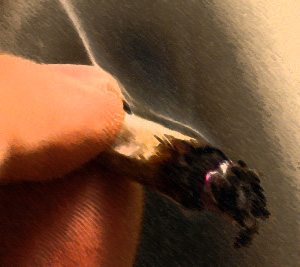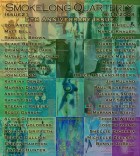Hey, Steven! Thanks so much for your great story, “BiC.” As readers probably know, half of the stories in the current issue of SmokeLong belong to past staff and guest editors. You were on staff for quite a long while. How many issues was it? What did you, as an editor, look for in stories you sealected for SmokeLong? What about your own story ” BiC” fits these criteria?
How many issues? I think I was on the staff for about two years, so eight issues. Being an editor was a great experience, one that I would encourage any writer to pursue. Being on the other side of the fence really opens your eyes to what makes a piece of fiction publishable.
I can’t say I actively looked for a particular type of story, but I guess I was always looking for something fresh, something I hadn’t read before. What you really learn from being an editor is that most submissions are hackneyed in concept. We could have filled every issue with “bad dad” stories (tales of drunken, cursing, abusive fathers). Not to make light of child or spouse abuse, but after you’ve read a hundred such flashes in a row, you start asking Isn’t There Something Else We Could Talk About?
Does “BiC” qualify under the freshness test? I hope so. I think “BiC” is an unusual story. I don’t think too many readers will accuse me of ripping off Raymond Carver with this one.
Seems to me, this story is about misdirection, the narrator leading us away from himself, his feelings, the painful event that has occurred in his life, focusing instead on this almost absurd encounter with the cat’s litter box. The story’s emotional impact is nonetheless heartbreaking. How does that work, and why?
I think it works because the words “I don’t know where you are” surprised me when I wrote them. I had no idea the story was going in that direction until those words ran onto the screen. I hope the reader is as surprised, blindsided, maybe, as I was.
We aren’t supposed to ask this question of writers and yet I think we probably want to ask it all the time. Given the very odd premise of this story, a pen found in a litter box, did this actually happen? Are your stories at all about you? Do you hide your stories from the people closest to you?
Some of my stories are completely autobiographical, but this one is not. This was a response to a writing prompt (write a flash involving a writing implement, a cat box, and a nail gun). I like writing to prompts, because they jiggle me free of my habitual props (e.g., dogs) and make me imagine something I’d never imagined before. When I write autobiographically it’s usually pretty tame, so I don’t try to hide anything. I try not to embarrass my sisters any more than is absolutely necessary.
There is no dialogue in this story, no confrontation between characters, with all the “action,” so to speak, occurring off screen. How did you get so much life into it?
Heck if I know. But the question makes me think of this: Flannery O’Connor described writing fiction as an “incarnational art.” By this she meant that the writer’s job is to create a tangible world, a world that can be experienced through the senses. I try to do that– sometimes I do it to excess–but I think that by focusing on details, by sticking your nose in the cat box, you can draw the reader into the world you’re trying to create. That’s the goal, anyway.
This issue marks SmokeLong‘s fifth anniversary, which has the staff thinking a lot about longevity and growth. There’s no denying the literary arena is fickle, with journals coming and going, writers shooting onto the scene then falling into a long hiatus, editors changing houses, agents merging, trends in what’s hot, what’s not. How do you, as a writer, endure the ups and downs? Have you experienced any setbacks? What measures have you taken to grow?
I try not to take any of it too seriously. I can’t control whether anyone else likes what I’ve written, so I don’t worry about it. If I like it, that has to be enough.
What measures have I taken to grow? I’m embarrassed to admit how many books about writing I own, or how many workshops I’ve taken. Is any of that worthwhile? Eh. Yes and no. You can learn technique from books, but not imagination. It’s easy to sit and read about writing, but unless you actually write, you’re just indulging a fantasy.
Workshops are tricky. They can be educational and inspiring, or they can be ruinous. You have to be willing to ignore everything you hear, while keeping an ear open for the one comment or suggestion that will make a difference.
Writers love looking for shortcuts, which is what books and workshops are. At the end of the day, it’s just you in a dimly lit room, picking at the scab of a story, trying to make it bleed. And all the books, workshops, seminars, daily affirmations, and prayer wheels in the universe won’t change that.



 The core workshop of SmokeLong Fitness is all in writing, so you can take part from anywhere at anytime. We are excited about creating a supportive, consistent and structured environment for flash writers to work on their craft in a community. We are thrilled and proud to say that our workshop participants have won, placed, or been listed in every major flash competition. Community works.
The core workshop of SmokeLong Fitness is all in writing, so you can take part from anywhere at anytime. We are excited about creating a supportive, consistent and structured environment for flash writers to work on their craft in a community. We are thrilled and proud to say that our workshop participants have won, placed, or been listed in every major flash competition. Community works.